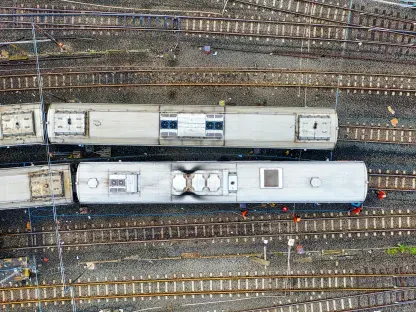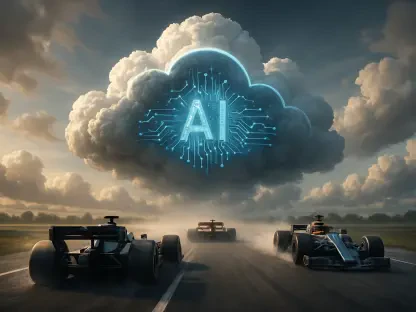The intricate world of application development is stretching its wings into a new era of transformation, illuminated by the latest research from Docker, Inc. Their survey of 885 application developers—meticulously unpacked by seasoned IT journalist Mike Vizard—offers a glimpse into an evolving ecosystem where 80% of developers weave containers into the fabric of their development. Yet, only about 36% are fully committed to the domain of microservices, with nearly half adopting a hybrid model that blends both microservices and traditional monolithic structures. This emergent landscape is marked by a fascinating transition, with developers navigating between the solid, tried-and-tested monoliths and the separated and scalable world of microservices.
The Application Architecture Ecosystem
Developers are increasingly stepping into a domain that does not bind them to a singular architectural creed. The Docker survey exposes an industry in flux, with a favorable leaning toward the hybrid model utilized by 48% of developers. This model amalgamates the steadfastness of monolithic frameworks with the lithe adaptability of microservices, straddling the line between convention and innovation. Meanwhile, the steady migration to microservices—29% of developers making the shift—indicates the allure of its advantages. Significantly, though the exodus from monolithic to microservice structures is more pronounced, the flowing tides of this architectural sea still carry 11% of developers back toward monoliths, suggesting that modernization does not necessarily spell obsolescence for traditional models.
Container Adoption and Tool Preferences
The prevalence of containers paints a vibrant picture of today’s development processes. A striking 76% of developers deploy containers throughout their software development lifecycle, showcasing the significant role of these technologies in creating a more streamlined and efficient environment for building and deploying applications. However, it’s not just about container usage; the survey spotlights the array of tools developers prefer. Docker Compose takes the lead, with 71% using it, followed closely by Docker Engine and Kubernetes. The latter, significant for its 42% adoption rate, signals a shift to container orchestration and management, underscoring the industry’s commitment to complex, scalable systems that can be piloted with precision.
Development Environments and Language Use
When it comes to developers’ workstations, the survey reveals a vibrant mosaic of operating systems, with Linux (53%) and macOS (50%) at the forefront, closely trailed by Windows (46%). This diversity in platforms is mirrored in their programming language preferences. JavaScript stands as the conquering titan among its peers, with formidable allies like Python, Node.js, and Java in its ranks. In the realm of databases, PostgreSQL claims the throne, trailed by other stalwarts such as MySQL/MariaDB and Redis. These choices underscore not only the versatility of today’s developers but also their savvy in selecting the right tools for task-specific effectiveness.
Workflow Efficiency and Experiences
The survey delves into the experiences of developers within their workflows, highlighting areas of contentment and contention. Developers find solace in coding and continuous integration—the harmonies in a chorus of otherwise disparate processes. However, this melody is occasionally discordant, with challenges lingering in testing, documentation, and debugging, especially once products reach production. These pain points echo across the industry’s landscape, resonating with anyone committed to crafting flawless software. While certain stages like planning and design are hailed as occasional bottlenecks, it’s clear that improvement in the development journey continues to be avidly sought.
The Influence of AI on Development
The development horizon bristles with the promise of artificial intelligence. An eye-opening 64% of developers are already utilizing AI for an assortment of tasks, including documentation and even writing code—ushering in an era where human ingenuity is augmented by machine intelligence. ChatGPT rattles the conversation with nearly half of the respondents experimenting with its capabilities. These AI integrations are greeted with optimism, positioning AI as a strategic partner in the development process, rather than a looming replacement.
The Necessity of Security in Development
Security, often whispered about rather than shouted, manifests as an undercurrent in the developmental tide, with a mere 14% identifying “shifting security left” as a trending priority. And yet, the quest for robust security tools is palpable among developers. Notables like SonarQube and AWS Security Hub feebly light the way, but the call for improved security measures can’t be ignored, highlighting the critical yet challenging nature of safeguarding applications from the get-go.
Open Source Contribution and Community Engagement
The realm of app development is entering a transformative phase, illuminated by the latest findings from Docker, Inc. Through a survey analyzed by IT journalist Mike Vizard, we see that 80% of the 885 developers surveyed are integrating containers into their workflow, highlighting a shift in the development process. However, full adoption of microservices seems more gradual, with only 36% diving in completely, while about half prefer a hybrid approach, mixing microservices with the traditional monolithic architecture. As developers pivot from the stability of monolithic applications to the modular, scalable space of microservices, the industry observes a compelling evolution. This shift represents developers’ balancing act as they optimize for modern practices without abandoning the reliability of established methodologies, providing a snapshot of innovation in progress.









